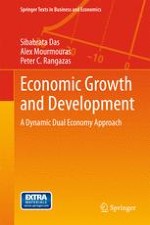2015 | OriginalPaper | Buchkapitel
3. Extensions to Neoclassical Growth Theory
verfasst von : Sibabrata Das, Alex Mourmouras, Peter C. Rangazas
Erschienen in: Economic Growth and Development
Aktivieren Sie unsere intelligente Suche, um passende Fachinhalte oder Patente zu finden.
Wählen Sie Textabschnitte aus um mit Künstlicher Intelligenz passenden Patente zu finden. powered by
Markieren Sie Textabschnitte, um KI-gestützt weitere passende Inhalte zu finden. powered by
